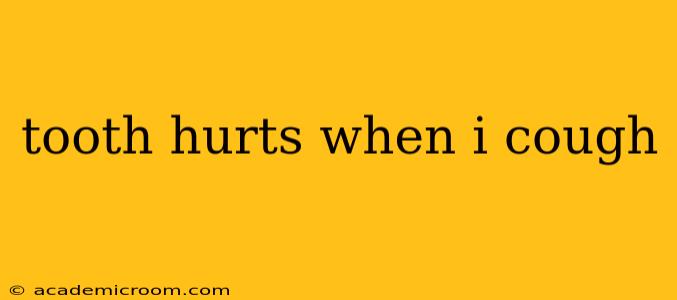Coughing shouldn't cause tooth pain, so if you're experiencing this, it's crucial to understand the underlying reason. This discomfort can stem from various issues, ranging from relatively minor to more serious dental problems. This article will explore the potential causes and provide guidance on seeking appropriate treatment.
What Could Be Causing My Toothache When I Cough?
The connection between coughing and tooth pain isn't direct. Instead, the act of coughing increases pressure within your head and sinuses. This increased pressure can aggravate pre-existing dental problems or expose underlying issues you might not have noticed before.
1. Sinus Infection (Sinusitis):
This is a common cause. Sinusitis involves inflammation of the sinuses, which are air-filled cavities near your nose and cheeks. When you cough, the pressure change can radiate pain to your teeth, especially your upper teeth, as they share close proximity to the sinuses. The pain might feel like a dull ache or sharp throbbing.
2. Abscess (Dental Abscess):
An abscess is a pus-filled pocket that forms at the root of a tooth due to infection. The increased pressure from coughing can put immense pressure on the already inflamed area, resulting in excruciating pain. This is a serious condition requiring immediate dental attention.
3. Cracked Tooth:
A tiny crack in your tooth might not cause pain under normal circumstances. However, the pressure shifts during a cough can force air or liquids into the crack, irritating the nerve and triggering pain.
4. Loose Filling or Crown:
A loose filling or crown can allow air or food particles to get under it, causing sensitivity and pain, exacerbated by the pressure changes from coughing.
5. Gum Disease (Periodontitis):
Advanced gum disease can lead to inflammation and infection around the tooth roots. Coughing can increase pressure in this area, intensifying the pain.
6. Temporomandibular Joint (TMJ) Disorder:
TMJ disorders affect the jaw joint and can cause pain not only in the jaw but also radiate to the teeth, ears, and head. The forceful action of coughing can aggravate TMJ pain, making it feel like your teeth hurt.
7. Referred Pain:
Sometimes, pain originating from another area, such as your ear, neck, or sinuses, might be felt in your teeth. Coughing can increase the pain intensity, making it feel like the teeth themselves are the source.
When Should I See a Dentist?
If your tooth pain is severe, persistent, or accompanied by other symptoms like fever, swelling, or difficulty opening your mouth, seek immediate dental attention. Don't delay treatment, especially if you suspect an abscess. A delayed diagnosis and treatment of a dental abscess can lead to more serious complications.
How Can I Manage the Pain Until I See a Dentist?
Over-the-counter pain relievers like ibuprofen or acetaminophen can help manage the pain temporarily. Rinsing your mouth with warm salt water can also soothe inflamed gums. Avoid chewing on the affected side until you see a dentist.
Disclaimer: This information is for general knowledge and does not constitute medical advice. Always consult a dentist or healthcare professional for diagnosis and treatment of any dental issue.
This comprehensive guide should address most of the queries surrounding tooth pain associated with coughing. Remember that early intervention is key to preventing further complications.
